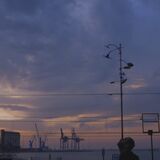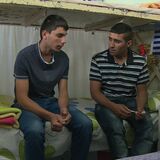# 5
16 June 2021 - 9 pm, Flery Cinema, Skippi 5-7, 17675 Kallithea, Greece
In three different visual and poetic approaches, based on personal experiences, the program’s second outdoor screening proposes films that concern the notion of borders, the fragile movement of bodies and the instability of transitory situations. Each film takes us on a physical and mental journey into the complexities and limitations of movement and belonging, of coming from and arrival.
"Ceuta’s Gate" by Randa Maroufi (2019, 19 min, France/Morocco)
VO Arabic and Spanish with English and Greek subtitles.
"Ceuta’s Gate" consists of a series of reconstructed situations based on observations made on the border of Ceuta, a Spanish enclave in the North of Morocco. The border is the scene of an intense traffic of manufactured goods, sold at discounted prices. Every day, thousands of people work there. The film shows this "ballet" of individuals around the border, and witness the dynamics of movement, the plastic and visual appearance of the passage, the characteristic situations of waiting and the redundancy of gestures.
"Pre-Image (Blind as the Mother Tongue)" by Hiwa K (2017, 18 min, Germany/Greece)
VO English with Greek and Arabic subtitles.
As a member of the immigrant generation that illegally journeyed from Iraqi Kurdistan to Europe on foot, Hiwa K’s ‘Mirror’ simulates an experience of walking through foreign territory. Using an “object-sculpture” made of stick and motorbike mirrors which he balances on his nose, Hiwa K finds his way. We can see glimpses of Hiwa K’s surroundings, what he calls “pre- images”, fragments of a puzzled future, which leave us with no choice but to continue looking up.
"The Longest Run" by Marianna Economou (2015, 74 min, Greece)
VO Arabic, Kurdish and Greek with English and Greek subtitles.
Filmed in a Greek juvenile prison and a court room, "The Longest Run" follows the stories of Alsaleh from Syria and Jasim from Iraq who are accused of smuggling illegal immigrants. Through their telephone conversations with their parents in the Middle East, the tragic events of the war enter the prison walls and accentuate the boys’ anxiety as the date of their court case approaches. Their fear escalates as they realize that it is impossible to convince the Greek court for their innocence and that they can easily be condemned to 25 years of imprisonment. By focusing on their friendship and the human face of confinement and war, the film reveals an unknown aspect of the refugee issue and the dead end situation that many underage find themselves in.
More info:
TAVROS website
Correspondences # 5: Essays by scholar and filmmaker Argyro Nicolaou and art and film critic Nicolas Feodoroff.
TAVROS website
In three different visual and poetic approaches, based on personal experiences, the program’s second outdoor screening proposes films that concern the notion of borders, the fragile movement of bodies and the instability of transitory situations. Each film takes us on a physical and mental journey into the complexities and limitations of movement and belonging, of coming from and arrival.
"Ceuta’s Gate" by Randa Maroufi (2019, 19 min, France/Morocco)
VO Arabic and Spanish with English and Greek subtitles.
"Ceuta’s Gate" consists of a series of reconstructed situations based on observations made on the border of Ceuta, a Spanish enclave in the North of Morocco. The border is the scene of an intense traffic of manufactured goods, sold at discounted prices. Every day, thousands of people work there. The film shows this "ballet" of individuals around the border, and witness the dynamics of movement, the plastic and visual appearance of the passage, the characteristic situations of waiting and the redundancy of gestures.
"Pre-Image (Blind as the Mother Tongue)" by Hiwa K (2017, 18 min, Germany/Greece)
VO English with Greek and Arabic subtitles.
As a member of the immigrant generation that illegally journeyed from Iraqi Kurdistan to Europe on foot, Hiwa K’s ‘Mirror’ simulates an experience of walking through foreign territory. Using an “object-sculpture” made of stick and motorbike mirrors which he balances on his nose, Hiwa K finds his way. We can see glimpses of Hiwa K’s surroundings, what he calls “pre- images”, fragments of a puzzled future, which leave us with no choice but to continue looking up.
"The Longest Run" by Marianna Economou (2015, 74 min, Greece)
VO Arabic, Kurdish and Greek with English and Greek subtitles.
Filmed in a Greek juvenile prison and a court room, "The Longest Run" follows the stories of Alsaleh from Syria and Jasim from Iraq who are accused of smuggling illegal immigrants. Through their telephone conversations with their parents in the Middle East, the tragic events of the war enter the prison walls and accentuate the boys’ anxiety as the date of their court case approaches. Their fear escalates as they realize that it is impossible to convince the Greek court for their innocence and that they can easily be condemned to 25 years of imprisonment. By focusing on their friendship and the human face of confinement and war, the film reveals an unknown aspect of the refugee issue and the dead end situation that many underage find themselves in.
More info:
TAVROS website
Correspondences # 5: Essays by scholar and filmmaker Argyro Nicolaou and art and film critic Nicolas Feodoroff.
TAVROS website



